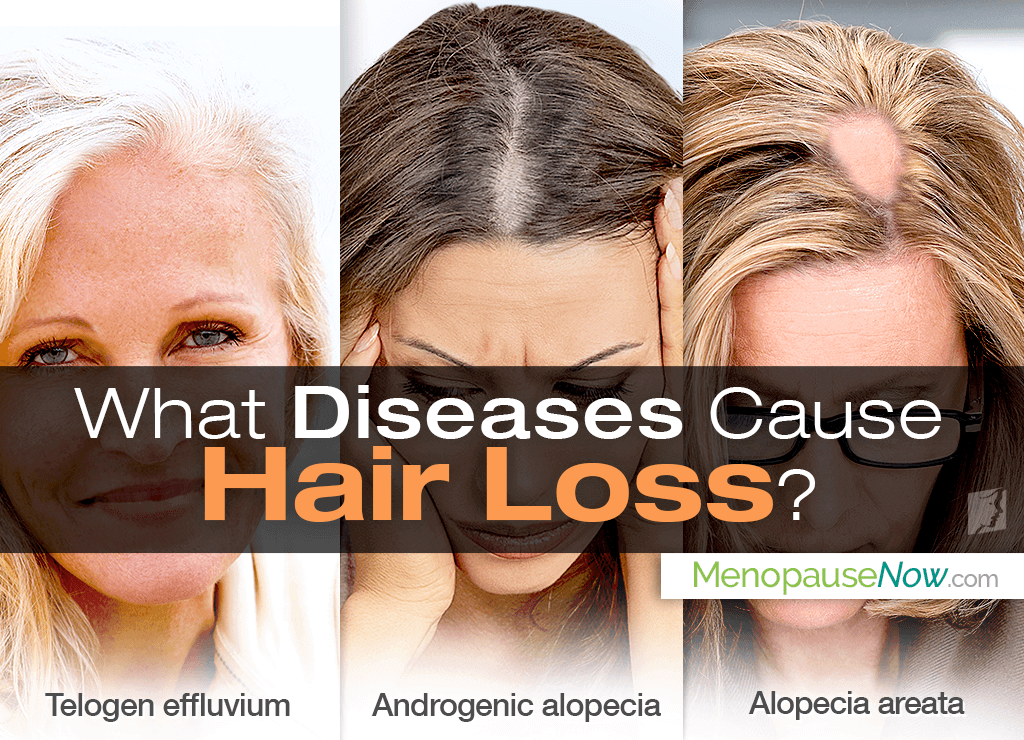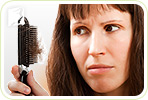By far, hair loss can be one of the most emotionally crippling symptoms a woman may experience as she is transitioning throughout her reproductive years and into postmenopause. Luckily, she doesn't have to throw in the towel and accept the repercussions of hair diseases.
Continue reading to learn more about common hair loss diseases and how to combat them so that your beautiful locks will be back where they should be.
What Diseases Cause Hair Loss?
First off, it is important to emphasize that hair loss is a symptom, not a disease.
Each of the hair diseases that cause hair loss involve a range of genetic, inflammatory, endocrine, or immune processes.
Some of the most common hair loss diseases in women throughout their reproductive lives include:
Telogen Effluvium
Telogen effluvium is a hair disease consisting of diffuse hair shedding, often with an acute onset. It is caused by a number of factors, such as severe chronic infections, illnesses, or stress; major surgeries; thyroid diseases; and medications, among others.
Androgenic Alopecia
Androgenic alopecia is hair loss disease characterized by diffuse thinning of hair on the top of the scalp due to high levels dihydrotestosterone (DHT), among other androgens. Unlike men, women with androgenic alopecia maintain their hairline, and the condition rarely leads to total baldness.
Alopecia Areata
Alopecia areata is an autoimmune hair disease. It is a genetic condition that - when combined with other factors - can trigger patchy hair loss over a short period of time, covering the entire body or specific areas, such as the scalp or eyebrows. Initially, alopecia areata can be reversible, but it is hard to treat.
What Can I Do About Diseases That Cause Hair Loss?
Finding a long-lasting solution to hair loss starts with identifying the symptom's underlying cause and targeting that specific culprit.
For menopausal women who are suffering from hair loss, this primary cause is generally hormonal imbalance as their ovarian hormone production comes to an end.
As such, hair loss treatments will revolve around encouraging a lifestyle that promotes hormonal balance and hair health - diet rich in phytoestrogens, iron, and protein - as well as the use of alternative medicines, such as phytoestrogenic herbal supplements or hormone-regulating supplements.
In severe cases, pharmaceutical drugs, such as minoxidil, and hair transplant surgeries will be recommended.
Key Takeaways
Without a doubt, diseases that cause hair loss can be some of the most frustrating and embarrassing to deal with as the locks keep shedding until a solution is found. Keep in mind that hair loss is a symptom of a bigger health condition occurring in your body, and some common hair diseases causing unsightly hair shedding in women are telogen effluvium, androgenic alopecia, and alopecia areata. But don't worry as treatment focused on targeting the root cause can normally reverse the damage. With a little patience and initiative in finding what works for you, your beautiful locks will be back.
Sources
- American Osteopathic College of Dermatology. (n.d.). Telogen Effluvium Hair Loss. Retrieved February 19, 2019, from https://www.aocd.org/page/telogeneffluviumha
- American Academy of Dermatology. (n.d.). Alopecia areata. Retrieved February 19, 2019, from https://www.aad.org/public/diseases/hair-and-scalp-problems/alopecia-areata
- U.S. National Library of Medicine. (2015). Androgenic alopecia. Retrieved February 19, 2019, from https://ghr.nlm.nih.gov/condition/androgenetic-alopecia
- Wolff, H. et al. (2016). The Diagnosis and Treatment of Hair and Scalp Diseases. Deutsches Arzteblatt International, 113(21), 377-386. doi: 10.3238/arztebl.2016.0377




